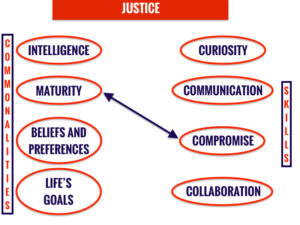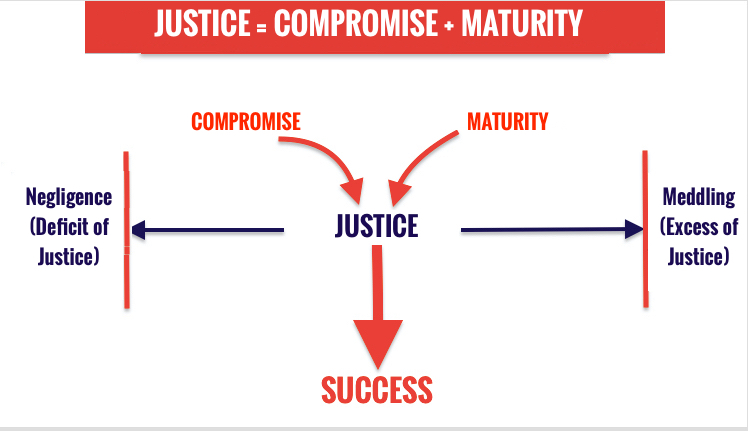Justice is defined in the dictionary as "the quality of being just; righteousness, equitableness, or moral rightness." The nature of this term is a combination of the relationship Skill of Compromise, with the trait or Commonality of Maturity. One might see how that can be, in that compromise is a kind of synthetic process, wading through separate goals and agendas to find what is in agreement among two people, but recognizing that there is often an area that they do not have in common in their goals, and must be set aside as purely personal in nature. Maturity has as its core nature, "fairness" in the form of constructive, "win/win" behavior and thinking. Justice is then, the principle of applying fairness to this synthetic process of finding common goals, but settling what is in disagreement, just as fairly.
It is then, not merely harsh and punitive, for punishment's sake, although it may seem so on the surface. It has often been said that the most just decision of all time was that of King Solomon, who, when confronted with two mothers both claiming the same baby, ordered the baby to be cut in two and half given to each of them. This of course, brought out the one, true mother, who would rather give up the baby to the false mother rather than seeing him meet his demise.
In this example, you can see not just what is merely "fair," or a body of ideas to consider in finding common ground. The common ground is in finding truth, fairly.

After a transgression in a relationship, Justice is a character virtue that doesn't just send each partner off, separately in a better or worse psychological state. It is an attempt at correction of an imbalance. This is what truly makes it "mature."
For example, using the Triune Brain Model, with its "three brains": the reptilian, the mammalian, and the higher brain, whose purposes personally and in romance, are the vitality of masculinity and femininity, general happiness, and success at reaching goals, respectively, imbalances may exist in any of the three, or all of them.
The diminishment of one's masculinity or femininity by a transgression is the same as "shame," which might come about on account of infidelity, or bankruptcy, or some other harm by one partner to another, that hurts "to the bone." The appropriate Justice in response is not retaliatory shame, but rather, the guilt that corrects the ethics of the offending partner, and corrects the shrewdness or intuition of the victimized partner, where when recompense and apology is made, gives them both a chance to return to harmony, together or alone.
The emotional unhappiness caused by a transgression results in either anger, or anxiety, or both, in which both partners need to learn more assertiveness and courage, respectively, to become happy again, and have yet another chance to be more satisfied in well-being, more confident, or both, together or alone.
The failure to reach a personal or joint goal caused by a transgression results in either confusion, or obsession or both, a lack of ethics, or intuition or both, and these are to be brought back into more balance by shunning any further vices in favor of more mature character virtues, such as that of Justice itself.
What makes Justice a unique character virtue is the potential actionable corrections of imbalance in a relationship it contains. When guilt, anxiety, anger, and failure have served their purposes and offered lessons in growth, the requirements of Justice are met, and relationship has a chance to be brought back into balance, unless the lessons are clearly lost on one or the other partner. If this is true, than the victimized partner need only leave the relationship, not seek retribution and revenge, which are also forms of suffering. If the lessons are taken in by both partners, and corrected (as in "The Department of Corrections"), then Justice also calls on us for forgiveness, which when appropriate, but refused, is also unjust in itself, and harmful to both the contrite partner and the unforgiving partner.
Through combining compromise with maturity, Justice links the higher brain to both the mammalian brain (giving confidence and satisfaction, fairly, to the partners) as well as the reptilian brain through being a character virtue that returns lost femininity and masculinity to both partners.

The vice of deficit for Justice is called, "Negligence," which is in essence, surrender of one's own personal agency and responsibility, whether in the role of the victimized partner, or the one who made the transgression. Solomon also did not step back and just let the two mothers have a fist-fight over the baby. He actively facilitated them to declare their own level fairness as the real judge of the truth.
When it comes to life's goals and your dreams, what is just will always be what allows both you, and your partner to reach your personal dreams, and hopefully, joint dreams. Like the best of couples' counseling, if that result can occur through staying together, then so be it, and if it can only happen by being apart, then also, so be it.
The ancient Aramaic language, the language of Jesus, literally defines the word, "sin," as meaning, "to miss the mark." This implies Justice, in that it carries an expectation of the correction of one's moral aim, and a chance to go on doing what is morally right in the future. Justice offers the solution to the frequent statement, "He'll never change" or "She'll never change."
Justice has bearing on our performance in phase three - intellectual attraction - step eight, where we seek to amplify the best virtues toward our goals. It is what causes us to see our mate as truly fair in character, and a chance for us to be "morally self-correcting" as self-determining individuals with a right to retain our dignity in changing for the better, even when we "miss the mark" in our conduct.

